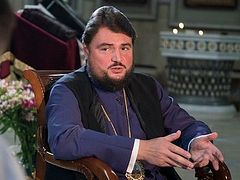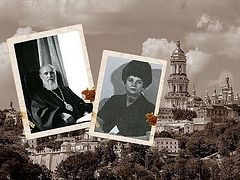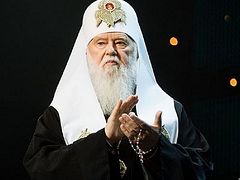Kiev, January 24, 2020
People can return to the Church from schism “with repentance, not with statements and ultimatums,” Vasily Anisimov, head of the canonical Ukrainian Orthodox Church’s press service told RIA-Novosti yesterday.
His statement comes in response to “Patriarch” Philaret Denisenko of the “Kiev Patriarchate” (KP) who recently said he is prepared to return to the canonical UOC and reunite his KP with it, provided that the Russian Church grants it autocephaly and allows it to become a Patriarchate. The creation of the new “Orthodox Church of Ukraine” by Constantinople only deepened the schism in Ukraine, Philaret believes.
“If the Moscow Patriarchate recognizes the Ukrainian Orthodox Church of the Moscow Patriarchate as an autocephalous Church with the status of a Patriarchate, then the next step will be the merger of the Kiev Patriarchate and the (UOC) Moscow Patriarchate into one Ukrainian Orthodox Church, but in the status of the Kiev Patriarchate. Then this Patriarchate will triumph. As a result of this union, the joining of parishes, episcopates, and dioceses [of the schismatic OCU—Ed.] will begin,” Philaret said.
Denisenko served as the canonical Metropolitan of Kiev for several decades until he went into schism after losing his bid to become the Patriarch of Moscow in 1990. Persisting in his schism, he was defrocked, excommunicated, and anathematized by the Russian Church.
“If you departed and you understand that you departed, and you want to return to the Church of Christ, then return, but return with repentance. We’re not a political organization,” Anisimov said, adding that everything that has happened in Ukraine over the past 30 years is “the work of the hand of Philaret. He’s the one that created this schism.”
The head of the press service also noted that Philaret has hardly any adherents anymore but yet is still trying to dictate his own terms.
The same position was stated a few days earlier by His Eminence Metropolitan Clement of Nizhyn, who noted that the schism is not just an administrative violation, but a huge sin that violates the principles of evangelical ethics.
Thus, Philaret “shouldn’t set the conditions for his return to the Church, but should be aware of his actions,” Met. Clement said, because “without this awareness, it is impossible to heal all the consequences of Philaret’s actions.”
The possibility of reunion can only be spoken about after Philaret truly repents of the sin of schism, Met. Clement said.
The Ukrainian Church is understandably cautious about the possibility of Philaret returning, given that he expressed the same sentiment in November 2017 but quickly reneged. The Bishops Council of the Russian Church received Philaret’s letter with joy and quickly formed a committee to handle the issue, but Philaret later declared that he had no intention of repenting of the sin of schism or returning to the Russian Church.
Some believe Philaret’s initial sentiment in the letter was sincere but that he backed down under serious pressure from politicians and others in his KP, and others have speculated that he raised the prospect of returning to the Russian Church in order to pressure the Patriarchate of Constantinople to take more decisive action towards creating an autocephalous Church in Ukraine.
Given how events unfolded in the following year, 2018, it is also possible that Philaret was simply seeking to have his anathema lifted by the Russian Church so that Constantinople could then grant autocephaly to his group. When this did not happen, Constantinople instead unilaterally lifted the anathema in October—a move that has been rejected by several Local Churches.
Philaret has since realized that he and the other Ukrainian schismatics were deceived by Constantinople, being given a tomos of autocephaly that in fact grants only semi-autonomy. Thus, this past summer, he split from the newly-formed “Orthodox Church of Ukraine” and revived his KP.
It is possible his latest statement about returning to the Russian Church is another attempt to pressure the Patriarchate of Constantinople, into granting full autocephaly to the OCU, as Ukrainian political analyst Rostislav Ishchenko believes.





